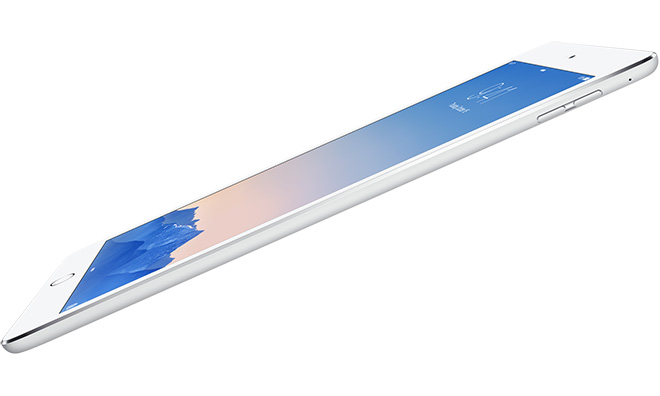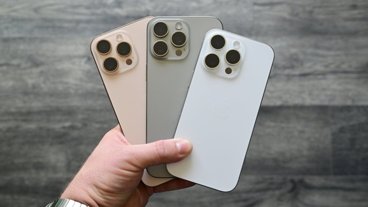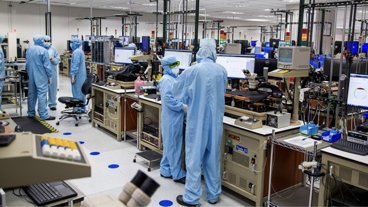Apple is estimated to pay suppliers $275 for each base-model iPad Air 2 — compared to $274 for the first-generation iPad Air — even as the company made the tablet even more slim, upgraded the application processor, and added a Touch ID sensor and NFC chip for in-app Apple Pay compatibility.
The most expensive 128-gigabyte LTE-enabled model, which retails for $829, is thought to book $358 in manufacturing costs. The figures were released Tuesday by market research firm IHS and first noted by Re/code.
The display continues to be the most costly part, estimated at some $77, but that price would mean Apple is paying approximately $13 less for each display than they did for the displays in the first-generation iPad Air. That drop is likely attributable to Apple's growing economies of scale, as the iPad Air 2's display largely matches that found in its predecessor.
"It's basically the same display from before, the same size, the same resolution, but with an anti-reflective coating added," IHS analyst Andrew Rassweiler told the publication.
The $11 Apple is believed to have spent on cameras for the device is slightly higher than last year's model, likely thanks to the upgraded rear shooter.
Overall hardware profit margins for the iPad Air 2 lineup are thought to be between 45 percent and 57 percent, depending on the configuration. It is unclear whether IHS's numbers include ancillary costs, such as marketing and support.
 AppleInsider Staff
AppleInsider Staff







 Charles Martin
Charles Martin


 Wesley Hilliard
Wesley Hilliard
 Stephen Silver
Stephen Silver
 William Gallagher
William Gallagher

 Marko Zivkovic
Marko Zivkovic









11 Comments
Feh! Here we go again. I'd like to point out, as I always do, that neither iSuppli, or any other company knows what Apple pays for parts. No company knows what any manufacturer of size pays for parts. This is all guesswork, kids! Apple, just like other large companies who can negotiate pricing, doesn't let those numbers out. It's all proprietary, and considered to be secret competitive information. So whatever iSuppli says can be read as just an estimate. They say that this year's Air 2 costs just one dollar more in parts? Really? They are so sure of their numbers that they can make a statement that Apple is paying just one third percent more this year?
Feh! Here we go again. I'd like to point out, as I always do, that neither iSuppli, or any other company knows what Apple pays for parts. No company knows what any manufacturer of size pays for parts. This is all guesswork, kids!
Apple, just like other large companies who can negotiate pricing, doesn't let those numbers out. It's all proprietary, and considered to be secret competitive information. So whatever iSuppli says can be read as just an estimate. They say that this year's Air 2 costs just one dollar more in parts? Really? They are so sure of their numbers that they can make a statement that Apple is paying just one third percent more this year?
Doesn't iSuppli get their component costs by getting actual quotes from the manufacturer or base it on similar parts from the same manufacturer? The actual price that Apple pays for each component is likely to be much lower because of their volumes. In other words, iSupply might be over-estimating the cost of iPads.
[quote name="RalphMouth" url="/t/183095/apples-ipad-air-2-manufacturing-costs-stay-level-despite-new-technology-report#post_2628664"] Doesn't iSuppli get their component costs by getting actual quotes from the manufacturer or base it on similar parts from the same manufacturer? The actual price that Apple pays for each component is likely to be much lower because of their volumes. In other words, iSupply might be over-estimating the cost of iPads. [/quote] In other words, no one should take any of these estimates seriously... y'know, like Apple analysts!
"The new iPad costs $1 more than last year's iPad, giving me reason to notify my investor clients that they should sell all their APPL positions, as this is a clear indication of Tim Cook's lack of leadership and inability to negotiate. This spells the downfall of Apple, and I predict the upside on the stock is no longer feasible."
Richard "Dick" Cabeça
Idiotic Investments, Inc.
"It's basically the same display from before, the same size, the same resolution, but with an anti-reflective coating added," IHS analyst Andrew Rassweiler told the publication.
What about the bonding process?
And what about the improved touch sensors, if what I read recently someplace else was true?
The bottom line is that these market research firms are merely guessing, because they don't know for sure. They are probably as reliable as analysts who pull figures out of their ass when it comes to AAPL.